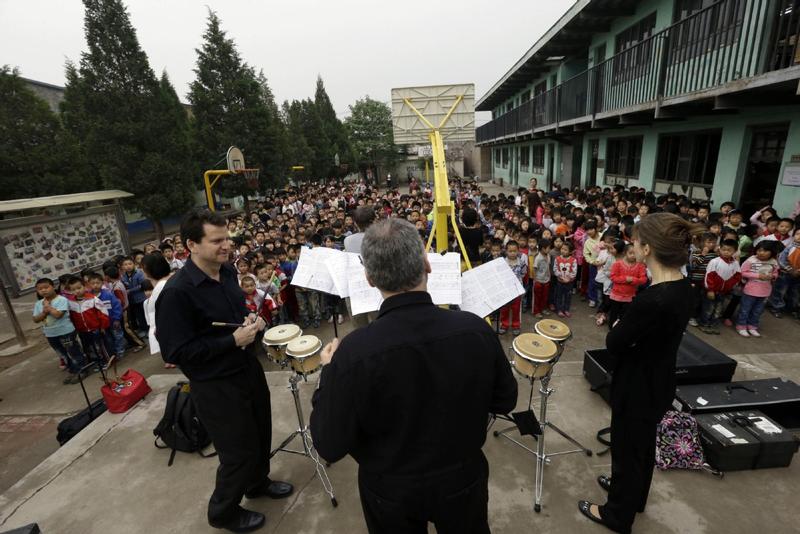For cultural ties between US, China, there's always an encore for orchestra
 Members of the Philadelphia Orchestra, Christopher Deviney (left), Don S. Liuzzi (center) and Angela Zator Nelson visit the Tongxin Experimental Primary School as part of a outreach program on the outskirts of Beijing in June 2013. (NG HAN GUAN / AP)
Members of the Philadelphia Orchestra, Christopher Deviney (left), Don S. Liuzzi (center) and Angela Zator Nelson visit the Tongxin Experimental Primary School as part of a outreach program on the outskirts of Beijing in June 2013. (NG HAN GUAN / AP)
Like ping-pong diplomacy, music has also helped open up relations between the peoples of the United States and China over the years, and it can continue to serve as a cultural bridge between the nations, experts said.
The people-to-people relationship began a year after US president Richard Nixon visited China in 1972, with exchanges of delegations, said Nicholas Platt, who accompanied Nixon on his historic trip to Beijing.
The president later secured an invitation to send the Philadelphia Orchestra to China in 1973 to help renew relations after decades of diplomatic isolation.
"The orchestra was a big hit and became a household word (in China). The reason why it did was because they did things beyond just playing music," said Platt, who was then chief of the political section at the US Liaison Office in Beijing.
A lot of people know about ping-pong diplomacy; that is what really opened up China-US relations. But music diplomacy is really just as important and arguably more lasting
"I remember the first day that we were there: The orchestra members came out of the hotel, and they started throwing Frisbees around at each other," he recalled at a recent webinar hosted by the Asia Society Northern California.
"That fascinated the Chinese public. You could get a crowd of 5,000 people in about 10 seconds."
The Philadelphia Orchestra was the first US orchestra to perform in China. During the 10-day visit, it performed four times in Beijing and twice in Shanghai. But that tour seems like "a forgotten chapter in American history" to Jennifer Lin, co-director of Beethoven in Beijing, a new documentary on it.
"A lot of people know about ping-pong diplomacy; that is what really opened up China-US relations. But music diplomacy is really just as important and arguably more lasting," she said at the webinar.
READ MORE: Music club set to give Shanghai a new beat
'Two-way street'
The documentary starts in 1973 and ends in the present day with a performance of a Chinese composer in Philadelphia because "we want to show the evolution of the music world in China and also the evolution of the relationship", said Lin.
"It's very important for audiences here in the United States to understand what's happening in China and to hear the music from composers in China," she said. "This cultural bridge today is very much a two-way street."
Platt agrees on the characterization of the relationship as a two-way street. He said he realized in 2010 that "the best thing to do was to play and to stay", instead of "come and play in a city and do a couple of concerts and then go away".
"It meant to use the orchestra's expertise to teach and to do concerts with other Chinese orchestras, go to conservatories and do pop-up concerts, which brought home to the Chinese that cultural exchange is a two-way street," he said.
ALSO READ: Classical sound of music enjoys the beat of pop
Since 1973, the Philadelphia Orchestra has been to China 12 times, more than any other in the US. The orchestra is now exploring performance opportunities in China for the fall of 2021, according to Ryan Fleur, its executive director.
The partnership with China has evolved from just playing for Chinese audiences to making music with Chinese musicians over the past years, said Fleur. "The aspiring musicians" in China are amazing and their technical ability is "so astounding".
The Philadelphia Orchestra also has started giving master classes to students from the Shanghai Conservatory of Music and from the China Conservatory of Music via the Zoom online platform.
"Now we're learning to connect directly with the people of China," said Fleur, adding that they are learning how to use the WeChat app to reach Chinese audiences.


